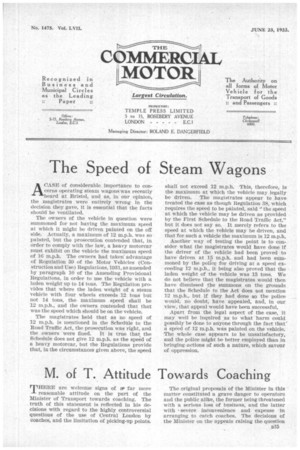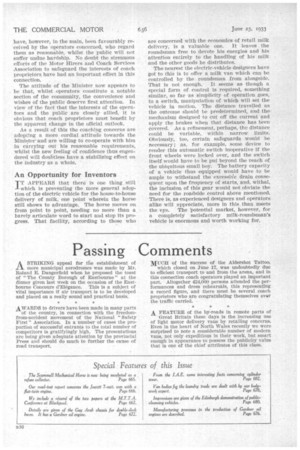M. of T. Attitude Towards Coaching
Page 29

Page 30

If you've noticed an error in this article please click here to report it so we can fix it.
?THERE are welcome signs of ar far more -Ireasonable attitude on the part of the Minister of Transport towards coaching. The truth of this statement is reflected in his decisions with regard to the highly controversial questions of the use of Central London by coaches, and the limitation of picking-up points. The original proposals of the MiniSter in this matter constituted a grave danger to operators and the public alike, the former being threatened with a serious loss of business, and the latter with • severe inconvenience and expense in arranging to catch coaches. The decisions of the Minister on the appeals raising the question have, however, in the main, been favourably received by the operators concerned, who regard them as reasonable, whilst the public will not suffer undue hardship. No ,doubt the strenuous efforts of the Motor Hirers and Coach Services Association to safeguard the interests of coach propriçtors have had an important effect in this connection.
The attitude of the Minister now appears to be that, whilst operators constitute a notable section of the community, the convenience and wishes of the public deserve first attention. In view of the fact that the interests of the operators and the public are closely allied, it is obvious that coach proprietors must benefit by the apparent change in the official outlook.
As a result of this the coaching concerns are adopting a more cordial attitude towards the Minister and are willing to co-operate with him in carrying out his reasonable requirements, whilst the new feeling of confidence thus engendered will doubtless have a stabilizing effect on the industry as a whole.
An Opportunity for Inventors
TT APPEARS that there is one thing still -I-which is preventing the more general adoption of the electric vehicle for the house-to-house delivery of milk, one point wherein the horse still shows to advantage. The horse moves on from point to point, needing no more than a barely, articulate word to start and stop its progress. That facility, according to those who are concerned with the economics of retail milk delivery, is a valuable one. It leaves the roundsman free to devote his energies and his attention entirely to the handling of his milk and the other goods he distributes.
The nearest the electric-vehicle designers have got to this is to offer a milk van which can be controlled by the roundsman from alongside. That is not enough. It seems as though a special form of control is required, something similar, so far as simplicity of operation goes, to a switch, manipulation of which will set the vehicle in motion. The distance travelled as the outcome should be predetermined, and the mechanism designed to cut off the current and apply the brakes when that distance has been Covered. As a refinement, perhaps, the distance could he variable, within narrow limits. Obviously, too, certain safeguards would be necessary; as, for example, some device to render this automatic switch inoperative if the front wheels were locked over, and the switch itself would have to be put beyond the reach of the ubiquitous small boy. The battery capacity of a vehicle thus equipped would have to be ample to withstand the excessive drain consequent upon the frequency of starts, and, withal, the inclusion of this gear would not obviate the need for the roadside control above mentioned.. There is, as experienced designers and operators alike will appreciate, more in this than meets the eye. The -potential market, however, for a completely satisfactory milk-toundsman's vehicle is enormous and worth working for.




























































































